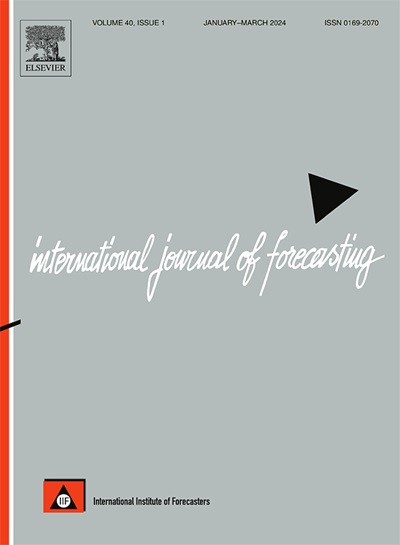Efficiency of poll-based multi-period forecasting systems for German state elections
IF 7.1
2区 经济学
Q1 ECONOMICS
引用次数: 0
Abstract
Election polls are frequently employed to reflect voter sentiment with respect to a particular election (or fixed-event). Despite their widespread use as forecasts and inputs for predictive algorithms, there is substantial uncertainty regarding their efficiency. This uncertainty is amplified by judgment in the form of pollsters applying unpublished weighting schemes to ensure the representativeness of the sampled voters for the underlying population. Efficient forecasting systems incorporate past information instantly, which renders a given fixed-event unpredictable based on past information. This results in all sequential adjustments of the fixed-event forecasts across adjacent time periods (or forecast revisions) being martingale differences. This paper illustrates the theoretical conditions related to weak efficiency of fixed-event forecasting systems based on traditional least squares loss and asymmetrically weighted least absolute deviations (or quantile) loss. Weak efficiency of poll-based multi-period forecasting systems for all German federal state elections since the year 2000 is investigated. The inefficiency of almost all considered forecasting systems is documented and alternative explanations for the findings are discussed.
基于民调的德国州选举多期预测系统的效率
选举民意调查经常用来反映选民对某一特定选举(或固定事件)的看法。尽管它们被广泛用作预测和预测算法的输入,但它们的效率存在很大的不确定性。这种不确定性因民意测验专家采用未公布的加权方案以确保抽样选民对潜在人口的代表性的判断而被放大。高效的预测系统会立即整合过去的信息,这使得基于过去信息的给定固定事件变得不可预测。这导致在相邻时间段内(或预测修正)的所有固定事件预测的顺序调整都是鞅差异。本文阐述了基于传统最小二乘损失和非对称加权最小绝对偏差(或分位数)损失的固定事件预测系统效率弱的理论条件。调查了自2000年以来德国所有联邦州选举的基于民意调查的多时期预测系统的弱效率。几乎所有被考虑的预测系统的低效率都被记录下来,并讨论了对这些发现的其他解释。
本文章由计算机程序翻译,如有差异,请以英文原文为准。
求助全文
约1分钟内获得全文
求助全文
来源期刊

International Journal of Forecasting
Multiple-
CiteScore
17.10
自引率
11.40%
发文量
189
审稿时长
77 days
期刊介绍:
The International Journal of Forecasting is a leading journal in its field that publishes high quality refereed papers. It aims to bridge the gap between theory and practice, making forecasting useful and relevant for decision and policy makers. The journal places strong emphasis on empirical studies, evaluation activities, implementation research, and improving the practice of forecasting. It welcomes various points of view and encourages debate to find solutions to field-related problems. The journal is the official publication of the International Institute of Forecasters (IIF) and is indexed in Sociological Abstracts, Journal of Economic Literature, Statistical Theory and Method Abstracts, INSPEC, Current Contents, UMI Data Courier, RePEc, Academic Journal Guide, CIS, IAOR, and Social Sciences Citation Index.
 求助内容:
求助内容: 应助结果提醒方式:
应助结果提醒方式:


